Controversial Maules Creek coal mine under investigation again over water use
ABC,
5 November, 2019
The controversial Whitehaven Coal Maules Creek mine is being investigated again, this time following complaints about its groundwater use which the company denies.
Key points:
- Natural Resource Access Regulator investigating Whitehaven's Maules Creek Coal Mine over groundwater use
- The mine has previously been investigated over its surface water use
- Farmers in the region say their groundwater has dried up since the mine opened
The company has already been found by the NSW regulator to have allegedly taken surface water unlawfully.
A briefing note prepared by the Natural Resources Access Regulator (NRAR) for the NSW Water Minister Melinda Pavey said NRAR is seeking advice on potential "civil and/or criminal proceedings".
Special counsel for the Environmental Defenders Office NSW (EDO NSW) Rana Koroglu has told 7.30 she understands that NRAR is meeting this week to make that decision.
"We understand the regulator is considering whether to commence criminal or civil proceedings or some other type of regulatory action," she said.
Regulator now investigating mine's groundwater use
The groundwater investigation comes as no surprise to brothers Rick and Phil Laird, who are both members of the Maules Creek Community Council and who farm near the mine.
They say their bore water has run dry.
"In my opinion, I think the groundwater is connected to the coal seams and the coal seams are being dug up for the mine," Phil Laird, a member and former National Co-ordinator of the Lock The Gate Alliance, told 7.30.
"I think a lot of the water that we've lost has ended up in the pit, and it's been used for coal washing and ultimately exported along with the coal."
The Lairds first raised their concerns about the mine's water use with the NSW Department of Planning in 2018.
"We believe that the Department of Planning never really investigated the water take at the mine," Rick Laird said.
"We knew what was going on. We tried to tell them what we thought."
They say they were told that the drought was responsible for the diminishing groundwater.
"A drought certainly is playing a part, and there's no doubt about it," Phil Laird said.
At the same time, one NSW government department was sounding the alarm.
Internal documents obtained by the Maules Creek Community Council through right to information legislation show that in 2018 the NSW Department of Industry delivered a scathing assessment of Whitehaven Coal's own water analysis and modelling.
The Department found the Whitehaven's 2017 review into its water use was "deficient in a number of areas" and the company did "not provide sufficient evidence to adequately determine if impacts [were] occurring to groundwater and connected water systems".
Later in 2018, the Department again took Whitehaven to task over its groundwater modelling and "generally poor correlation between modelled and observed data".
The Department warned of "significant implications" for the mine's "licensing requirements and the water balance".
Farmers struggle in bidding for water rights
 PHOTO: Andrew Watson says farmers are being outbid by the mine at auction for access to extra water. (ABC News: Simon Beardsell)
PHOTO: Andrew Watson says farmers are being outbid by the mine at auction for access to extra water. (ABC News: Simon Beardsell)
On top of the alleged unlawful water take, farmers are also struggling to compete with the mine for legitimate water access at auction.
Andrew Watson is one of the biggest irrigators and agricultural producers in the region, and he said he is being muscled out by the mine.
"Historically, we've been able to get into the market and buy water in a drought," he told 7.30.
"The mining industry is buying its way and bidding each other up to take water at prices we just can't get anywhere near."
Andrew Watson says the lack of water means his current crop yield is a tenth of what he used to get during times of drought.
"[Farmers are] not just tightening the belt around here, they're leaving the industry in droves."
Mr Watson told 7.30 that farmers typically pay $110-$130 per megalitre but have recently been outbid by mining companies paying up to $950 per megalitre for temporary water.
For permanent water supplies, farmers say mining companies have paid almost twice the usual rate of $2,850-$2,950 per megalitre.
 PHOTO: Sally Hunter says local farmers say the mine has added to the pressure on local farmers. (ABC News)
PHOTO: Sally Hunter says local farmers say the mine has added to the pressure on local farmers. (ABC News)
Sally Hunter is a farmer and member of People For The Plains, a grassroots group affiliated with the Lock The Gate Alliance.
She said Whitehaven Coal's thirst for water is putting more pressure on farmers already struggling with drought.
"They look around and they see a mine that's still operating at full capacity and seeking to grow and expand and have more mines in the region," she said.
"We're at a crisis point with our water."
Whitehaven says 'no evidence'
 PHOTO: Whitehaven Coal's chief executive Paul Flynn (centre), with MP Mark Coulton and then-minister for industry Ian Macfarlane at the opening of Maules Creek coal mine. (Tawar Razaghi)
PHOTO: Whitehaven Coal's chief executive Paul Flynn (centre), with MP Mark Coulton and then-minister for industry Ian Macfarlane at the opening of Maules Creek coal mine. (Tawar Razaghi)
Whitehaven Coal denies taking more water than it is allowed.
In a statement to 7.30, it also rejected that it had contributed to "groundwater drawdowns in the area in any way that has negatively affected local farmers and irrigators".
It said that it used just under 70 per cent of its water allocation of "10,000 megalitres from a range of licensed ground and surface water sources".
The company would not confirm the prices it had paid for temporary or permanent water but noted that water was a tradeable commodity.
"It can be sold and bought on an open market where there is a seller and a willing buyer," the statement said.
"We acknowledge there is competition for water in the area and, as in any other free market, demand drives up price."
Whitehaven Coal said it had worked closely with the NSW Department of Industry to address the concerns raised in 2018 about the mine's water analysis and modelling.
7.30 has sought comment from the Department of Industry.
Potential surface water penalties due this week
 PHOTO: Rana Koroglu of the Environmental Defenders Office says the Maules Creek Mine has not complied with water legislation. (ABC News)
PHOTO: Rana Koroglu of the Environmental Defenders Office says the Maules Creek Mine has not complied with water legislation. (ABC News)
EDO NSW lawyer Rana Koroglu said the Maules Creek mine was approved on condition that it complied with the relevant water legislation.
"The main source of water that the mine was to rely on for its operations was a 3,000 megalitre water licence from the Namoi River, and that was a high-security license," Ms Koroglu said.
She detailed NRAR's preliminary findings into the Maules Creek mine's use of surface water.
"Whitehaven didn't build the dams they were meant to build, which were meant to capture clean water runoff," she said.
"They didn't divert that clean water around the mine site to be released back into the environment.
"And they used that water in their mining operations without the appropriate licences."
Drought-stricken farmers say they are pleased that Whitehaven Coal's Maules Creek mine is again under investigation for its water take.
NRAR announced preliminary findings in September which "concluded alleged unlawful water take is occurring" of surface water at the Maules Creek mine.
A briefing note prepared by NRAR for the NSW Water Minister, Melinda Pavey, said NRAR is seeking advice on potential "civil and/or criminal proceedings".
Minister Pavey declined 7.30's request for an interview.
A spokeswoman said the Minister had neither received nor read the NRAR briefing note




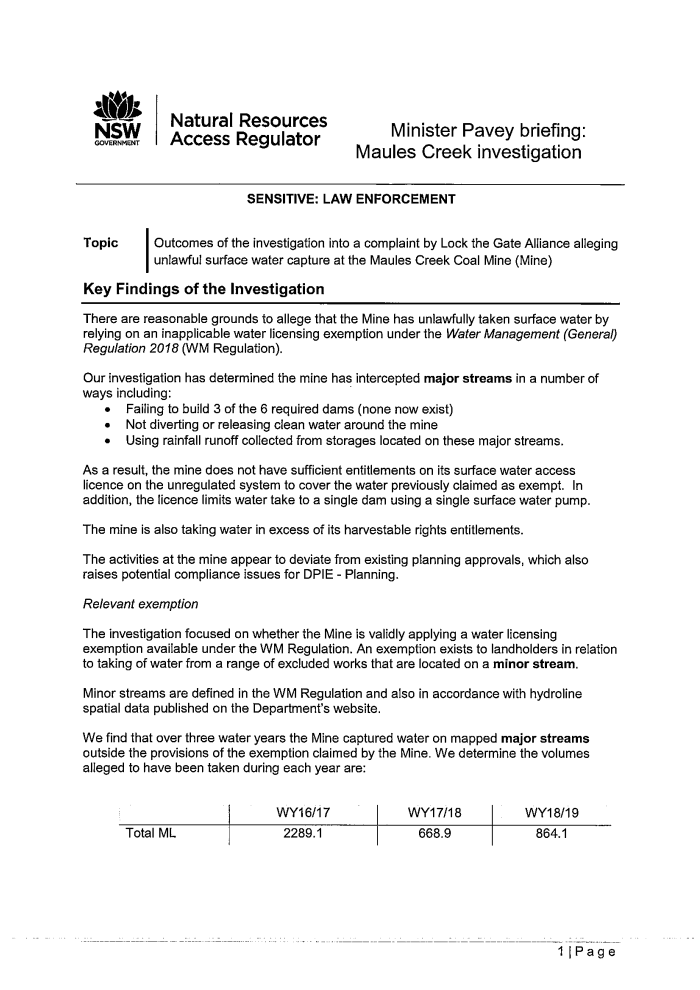
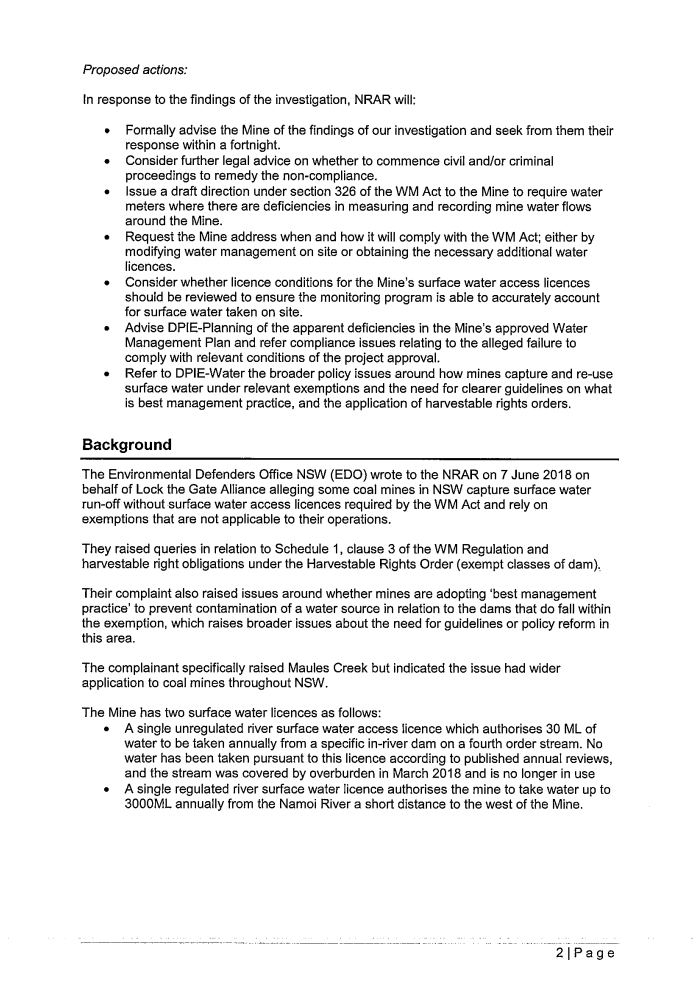

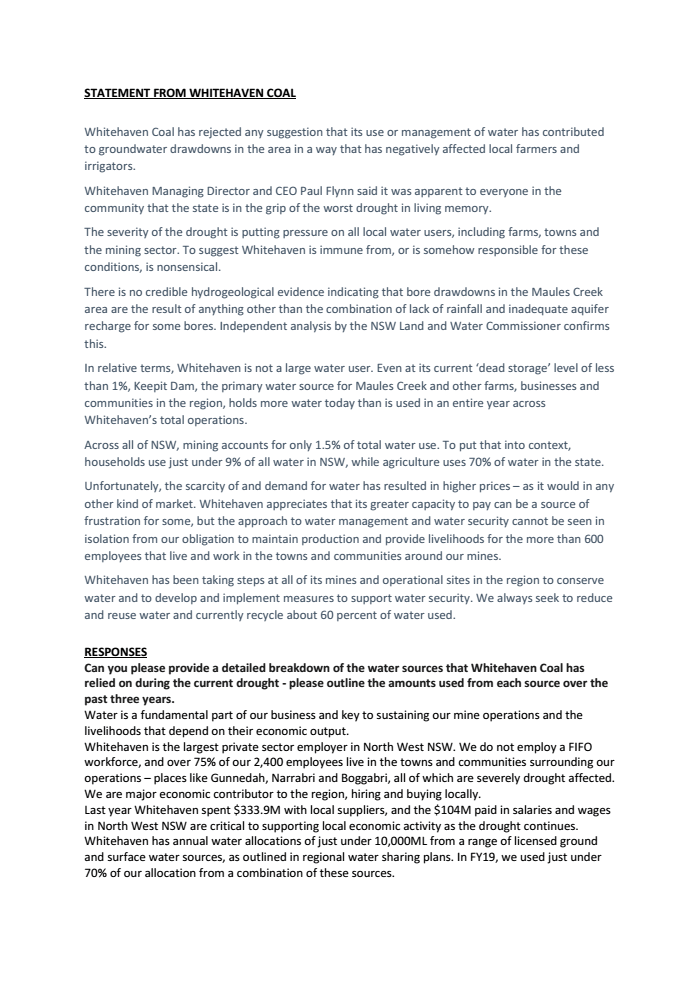
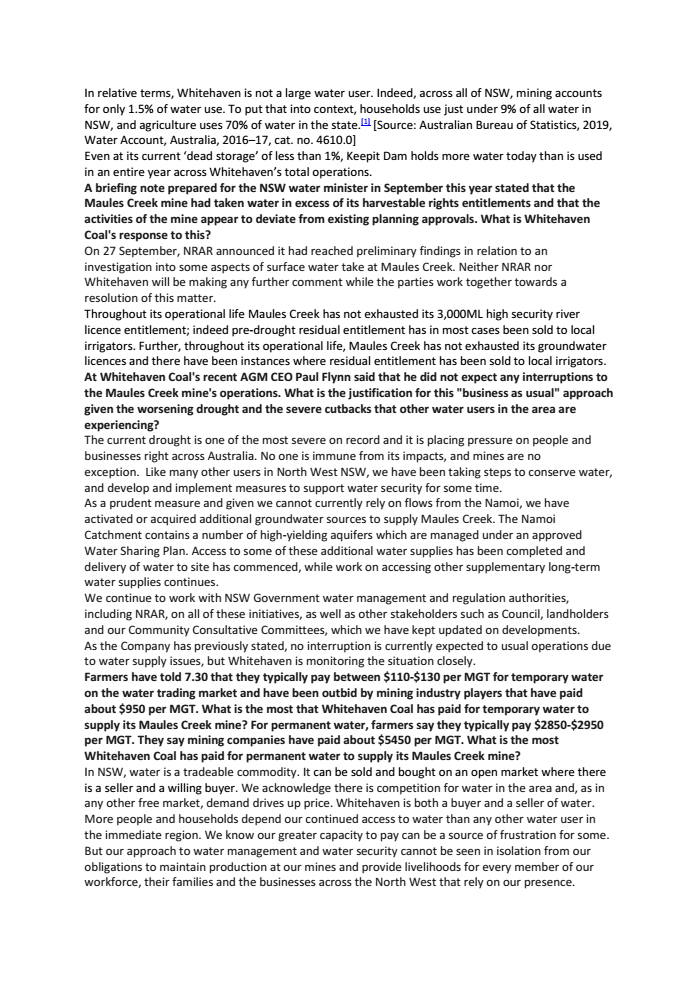
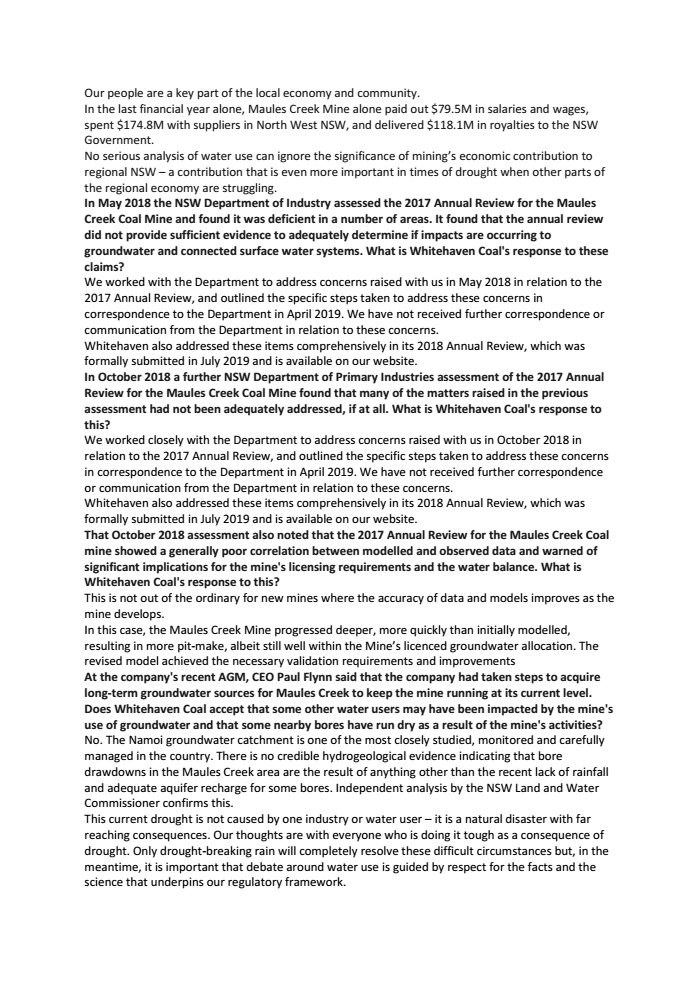
No comments:
Post a Comment
Note: only a member of this blog may post a comment.